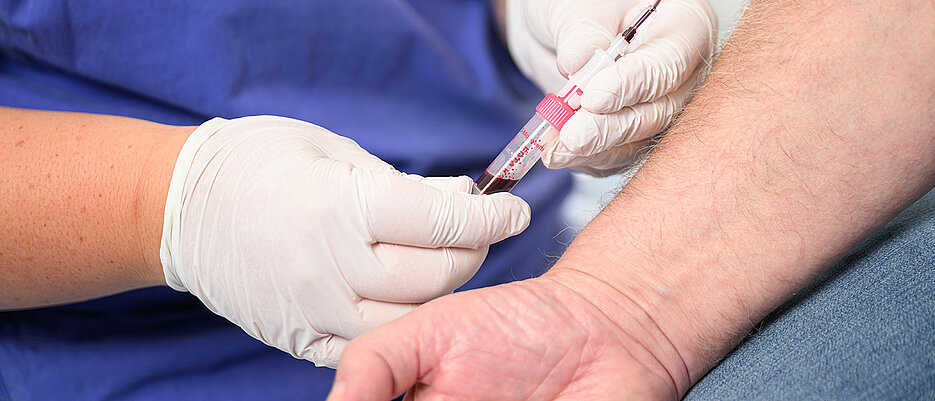Anaemia is not Uncommon in the Operating Theatre
11/18/2025One in three people who undergo major surgery suffers from anaemia. This is shown by a new study involving the Würzburg University Medical Centre.

Anaemia, also known colloquially as anaemia, weakens the body even in its normal state. Due to the reduced haemoglobin concentration in the blood, the cells are not supplied with sufficient oxygen. Haemoglobin is an oxygen-carrying protein found in red blood cells (erythrocytes). A lack of haemoglobin leads to tiredness, fatigue, headaches and cardiovascular problems.
During an operation, the body is under stress, which increases the risk of complications such as cardiovascular problems and infections. As the organs and tissue are less well supplied with oxygen, wound healing is also delayed. Finally, anaemic patients require more frequent blood transfusions, which harbours further risks.
Strengthening the Body's own Blood Reserves
Iron deficiency is often seen as the main reason for this anaemia. For this reason, pre-operative treatment as part of "patient blood management" has so far been limited to the administration of iron supplements. Replenishing the iron stores promotes the formation of new blood cells, improves the oxygen supply and reduces the need for transfusions.
However, anaemia can actually have many different causes. In order to gain a better understanding of these and to make treatment more targeted, the international, multicentre, prospective ALICE study investigated how often anaemia occurs before major surgery and what the causes are.
"Our aim is to increase patient safety and establish holistic anaemia management," say Professors Patrick Meybohm, Director of the Department of Anaesthesiology, Intensive Care Medicine, Emergency Medicine and Pain Therapy at the University Hospital of Würzburg (UKW), and Kai Zacharowski, Director of the Department of Anaesthesiology, Intensive Care Medicine and Pain Therapy at the University Hospital of Frankfurt/Main. Meybohm and Zacharowski are the last authors of the study. As heads of the German Patient Blood Management Network, they are particularly keen to strengthen the body's own blood reserves.
The analysis of the data from a total of 2,830 patients from 79 hospitals in 20 countries on five continents has now been published in the renowned journal The Lancet Global Health . The people analysed in the study were at least 18 years old, had undergone major surgery and had been hospitalised for at least 24 hours.
A Lack of Folic Acid or Vitamin B12 Can also Lead to Anaemia
First author Dr Suma Choorapoikayil from the University Medical Centre Frankfurt summarises the results: "One in three of the patients had anaemia. More than half of them (55.2 per cent) had an iron deficiency, 7.7 per cent a vitamin B12 deficiency, 14.5 per cent a folic acid deficiency and 8.7 per cent a chronic kidney disease. Our results also showed that pre-operative anaemia increases the risk of blood transfusions threefold, the complication rate two and a half times and mortality fivefold."
The authors agree that it is crucial for the future to no longer ignore preoperative anaemia, which occurs with such high frequency and has a significant impact on the surgical outcome. In addition to iron deficiency, vitamin B12 and folic acid deficiency must also be taken into account diagnostically and therapeutically.
Publication
The aetiology and prevalence of preoperative anaemia in patients undergoing major surgery (ALICE): an international, prospective, observational cohort study. Choorapoikayil, S., Baron, D.M., Spahn, D.R., Lasocki, S., Boryshchuk, D., Yeghiazaryan, L., Posch, M., Bisbe, E., Metnitz, P., Reichmayr, M., Zacharowski, K., Meybohm, P., the German Society of Anaesthesiology and Intensive Care (GSAIC) Trials Group, SFAR research network, Supportive Anaesthesia Trainee-led Audit and Research Network (SATURN), and the ALICE study collaborators. The Lancet Global Health 2025, Volume 13, Issue 12, e2041 - e2050







